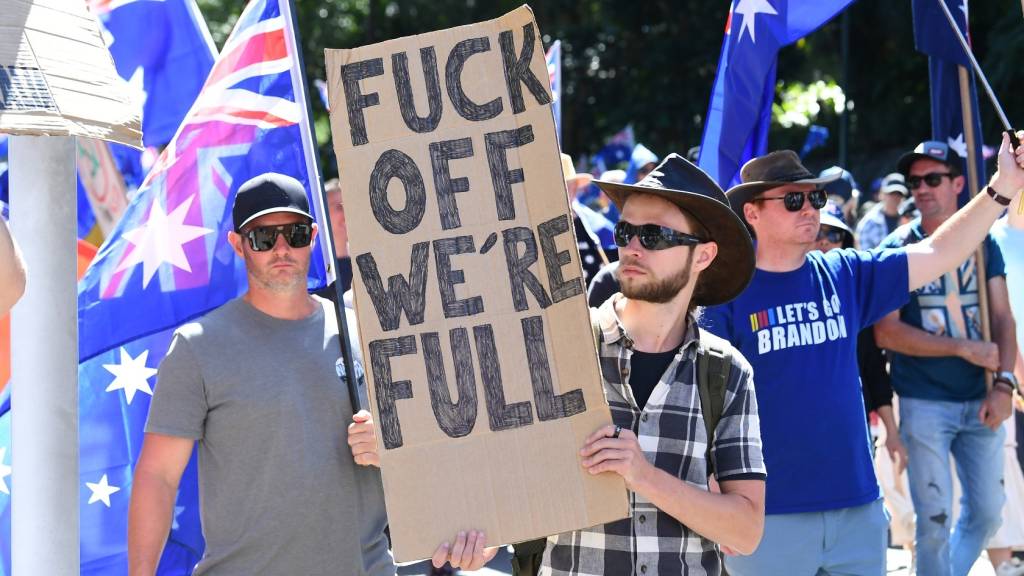Wherever you look on migration, there are interests trying to exploit the issue.
The government presided over a massive spike in migration in the wake of the pandemic, with its forecasts repeatedly mocked by reality. Its response was to overhype the limited problem of foreign student pressure on housing, and then boast of its toughness in trying to impose a clumsy cap on foreign students — all while continuing to incentivise Australia’s higher education providers to rely on foreign students for research funding.
The Coalition has an even more tortured relationship with migration. If John Howard relied on the cover of being tough on border security to run a high-migration program that helped big business and juiced economic growth, under Trump-lite Peter Dutton, it not only peddled the Great Replacement Theory, but turned on migration per se as well.
Related Article Block Placeholder
Article ID: 1219704
But the Liberals’ business constituency — and the increasing skill shortages plaguing an ageing economy — meant that finding cuts to migration was too hard. The Coalition then went to the 2025 election with an incoherent migration policy, summed up by Dutton (who warned that foreign students were rapists), and refused to support Labor’s foreign student cap.
Politicians, from local government to the prime minister, find in migration a convenient scapegoat for a housing crisis they themselves have spent generations creating through tax policies, poor planning and regulation, and corrupt development application processes.
Independent. Irreverent. In your inbox
Get the headlines they don’t want you to read. Sign up to Crikey’s free newsletters for fearless reporting, sharp analysis, and a touch of chaos
By continuing, you agree to our Terms & Conditions and Privacy Policy.
There are few credible, non-political voices to participate in a rational debate about migration either. Readily acknowledged is that Australia is an immensely successful migrant country — unless you’re First Nations. The benefits of migration in an ageing workforce have few proponents, even though the idea of living in a society with a dramatically smaller care workforce or construction workforce isn’t particularly appealing to anyone.
The business lobby, big or small, has no clean hands: small business is riddled with employers who abuse foreign students, temporary visa workers and other easily exploited labour sources, while big business is riddled with systemic wage thieves. Making the case that Australia needs migrants because we don’t have enough workers of our own is a lot harder when business routinely tries to underpay workers. And Pauline Hanson, of all people, is correct to blame big business and government for relying on high migration to boost profits and growth.
Even the hard left doesn’t come to the debate with goodwill. Refugee advocates push a “let them all come” ideology of border (non-)control that has many parallels with the open-borders ideology of hardline neoliberals. That mindset views any effort by governments to manage who comes into the country as an outrage to human dignity, to be met with incessant litigation, enabling a visa system that can be manipulated by organised crime.
Commentating on all this is a media that operates as a giant vested interest on migration. Until Nine’s recent sale of Domain, the two largest media companies in the country had major interests in real estate platforms; News Corp still owns a chunk of gouging oligopolist realestate.com.au. That company has a double interest in high migration: it can demonise migrants as part of its business model of fostering hate and division, while enjoying profits from the buoyant property market that migration enables. News Corp, Seven and the plagiarists’ paradise the Daily Mail routinely rely on inciting division and conflict, with migrants as a hardy perennial.
Related Article Block Placeholder
Article ID: 1219502
But behind the whole debate lurks a far more malignant group of players: far-right extremists who see concerns about the level and impact of migration — policy challenges that can be overcome with better housing, taxation, infrastructure and care sector policies — as the ideal vehicle for inciting fear about the source of migration. For neo-Nazis and white nationalists, frustration about high house prices and clogged infrastructure can be the gateway drug to recruitment into an ideology of race-hate and violent extremism.
Their goal is the normalisation of an extremist agenda. They’ve seen it work in the United States, where neo-Nazis and white supremacists no longer feel the need to protest because their “concerns” are mainstream. It’s been the work of years — decades even — but given enormous support by Fox News and Donald Trump. Trump has steadily shifted the global understanding of what is decent in politics and public policy further and further in the direction of fascist autocracy, with little in the way of pushback from what is purportedly the world’s greatest democracy.
The task of normalising race hate in Australia is harder. We have compulsory voting, an independent electoral regulator, a far better social safety net and have refused to go down some of the darker paths of neoliberalism that have alienated so many Americans. But we share many similarities with the United States, including powerful media companies devoted to division, super-wealthy figures keen to manipulate politics, and a conservative party constantly tempted to resort to populism. The No vote against an Indigenous Voice to Parliament was a taste of how quickly division and hate can snowball into an electorally effective coalition — with many migrants and children of migrants voting against recognising our First Peoples.
Finding clean hands anywhere is a tough ask.
Which group is the biggest stoker of anti-immigration grievances?
We want to hear from you. Write to us at letters@crikey.com.au to be published in Crikey. Please include your full name. We reserve the right to edit for length and clarity.



